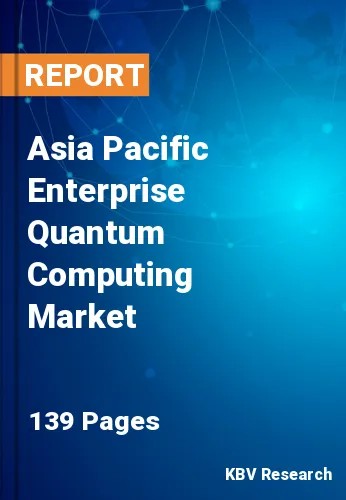The Asia Pacific Enterprise Quantum Computing Market would witness market growth of 25.5% CAGR during the forecast period (2022-2028).
Medical research is a further area where quantum computing is being used. When you think that this might be a medicine given to billions of individuals, each with tiny variations in their composition, the number of possible reactions throughout the human body is literally in the trillions. Today, finding a novel treatment and bringing it to market may take pharmaceutical corporations up to 10 years and sometimes billions of dollars. Quantum computing may significantly reduce costs and time to market, making it easier to reuse already-approved medications for new uses and enabling computational chemists to generate new discoveries more quickly that may result in the treatment of a variety of ailments.
New technologies like autonomous automobiles have the potential to raise living standards while lowering pollution, easing traffic, and preventing fatal accidents. Using quantum computing, the procedure might be sped up. Finding the best choice out of a variety of possibilities is part of the art of solving optimization issues. Modern classical computers use substantial quick cuts to handle big optimization issues. Sadly, these answers are often only partially ideal. However, governments can improve air traffic management, financial services companies may optimize risks, and telecom companies can modernize their network architecture thanks to quantum computing. Even retailers and firms selling consumer goods may improve the effectiveness of their marketing promotions.
A promising market for providers of quantum computing is anticipated to exist in India, a country with a fast-expanding economy. Indian businesses are making large investments to speed up the field of quantum computing research. Major economies in the Asia Pacific, including India and Australia, have seen a sharp rise in the demand for cloud-based quantum computing solutions, opening up new growth prospects for market participants.
The China market dominated the Asia Pacific Enterprise Quantum Computing Market by Country in 2021; thereby, achieving a market value of $519.1 million by 2028. The Japan market is exhibiting a CAGR of 24.8% during (2022 - 2028). Additionally, The India market would experience a CAGR of 26.3% during (2022 - 2028).
Based on Deployment Mode, the market is segmented into On-premises and Cloud. Based on Technology, the market is segmented into Superconducting, Quantum Annealing, Trapped ion, Quantum dot and Others. Based on Application, the market is segmented into Cyber security, Machine Learning/Deep Learning/AI, Simulation & Data Modelling, Optimization and Others. Based on Component, the market is segmented into Hardware, Software and Services. Based on Vertical, the market is segmented into BFSI, Telecom & IT, Aerospace & Defense, Energy & Utilities, Healthcare & Life Sciences, Manufacturing and Others. Based on countries, the market is segmented into China, Japan, India, South Korea, Singapore, Malaysia, and Rest of Asia Pacific.
Free Valuable Insights: The Worldwide Enterprise Quantum Computing Market is Projected to reach USD 6.4 Billion by 2028, at a CAGR of 24.4%
The market research report covers the analysis of key stake holders of the market. Key companies profiled in the report include Alibaba Group Holding Limited, D-Wave Systems Inc., Google Llc, Huawei Technologies Co. Ltd., Id Quantique, Intel Corporation, IBM Corporation, Microsoft Corporation, Rigetti & Co, Inc., and Toshiba Corporation
By Deployment Mode
By Technology
By Application
By Component
By Vertical
By Country
Our team of dedicated experts can provide you with attractive expansion opportunities for your business.

